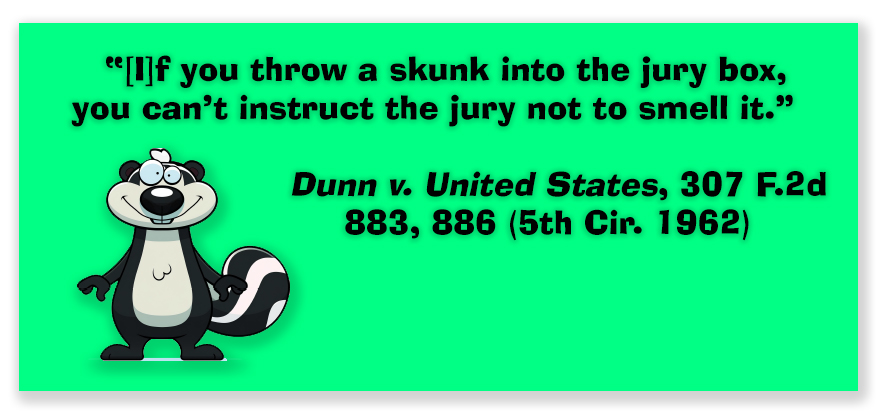We post news and comment on federal criminal justice issues, focused primarily on trial and post-conviction matters, legislative initiatives, and sentencing issues.

WOULDA, COULDA, SHOULDA
 A tough battle for anyone filing a 28 USC § 2255 post-conviction motion claiming ineffective assistance of counsel is to successfully argue that his or her defense attorney should have done something different – called a different witness, made a different objection, pursued a different theory – that would have won the case. Strickland v. Washington, the gold standard of ineffective assistance of counsel, holds that a lawyer’s strategic choices are almost sacred, as long as they result from adequate investigation.
A tough battle for anyone filing a 28 USC § 2255 post-conviction motion claiming ineffective assistance of counsel is to successfully argue that his or her defense attorney should have done something different – called a different witness, made a different objection, pursued a different theory – that would have won the case. Strickland v. Washington, the gold standard of ineffective assistance of counsel, holds that a lawyer’s strategic choices are almost sacred, as long as they result from adequate investigation.
John Neuhard ran into that last week. John was indicted on child porn production and related counts. When John’s court-appointed lawyer, Richard Korn, met with him, he was puzzled by John’s “awkward behaviors when answering questions” and “flat, emotionless” responses in a recorded police interrogation.
Rick discussed the issue with John’s prior attorney, with John’s parents, and with John himself. Rick hired two experts, one of whom found John was autistic while the other thought the diagnosis was inconclusive. Rick checked out his client’s school record and read up on autism and any connection to sexual crimes.
Rick concluded it was a “close call” but decided that introducing John’s autism at trial was likely to do more harm than good. Rick worried that, regardless of what an expert might caution, the jury would view John as a “mentally ill sexual deviant who lacked control over his impulses,” as the 6th Circuit put it. “So, he decided that he would introduce autism evidence only if ‘absolutely necessary.’”
 Rick’s defense theory was classic SODDI – ‘some other dude did it.’ John lived with three other guys, Rick argued, any of whom had access to the computer and could have produced the porn. During the investigation, all three of the others offered to take polygraph tests, a fact that the government and Rick agreed before trial would not be mentioned. Nevertheless, during her testimony, a government agent volunteered that the other three residents “were cooperative, helpful, offered to take lie detector tests…” Rick objected and during a sidebar, asked the Judge to cure the error by letting Rick introduce evidence that John had also offered to take a polygraph, too, at least before he lawyered up and withdrew his offer.
Rick’s defense theory was classic SODDI – ‘some other dude did it.’ John lived with three other guys, Rick argued, any of whom had access to the computer and could have produced the porn. During the investigation, all three of the others offered to take polygraph tests, a fact that the government and Rick agreed before trial would not be mentioned. Nevertheless, during her testimony, a government agent volunteered that the other three residents “were cooperative, helpful, offered to take lie detector tests…” Rick objected and during a sidebar, asked the Judge to cure the error by letting Rick introduce evidence that John had also offered to take a polygraph, too, at least before he lawyered up and withdrew his offer.
The court instead struck the remark from the record and admonished the jury twice not to consider any testimony “about other people offering to go take a polygraph.”
After the government rested its case, Rick moved for a mistrial, arguing that the court’s instruction did not remedy the damage caused by the agent’s statement. The court denied the motion and, of course, John got convicted.
John hired a new lawyer, who raised six issues on appeal. His conviction was upheld, with the Circuit specifically finding that the district court had not abused its discretion in rejecting lawyer Rick’s polygraph offer and instead giving a limiting instruction.
John filed a § 2255 motion arguing that Rick was ineffective by not investigating his autism sufficiently and by bungling the polygraph mistrial argument. The district court denied the motion after a hearing, and John appealed.
Last week, the 6th Circuit affirmed the district court. An attorney making a strategic decision must adequately investigate his options and make a reasonable choice between them. A strategy is reasonable, the Circuit said, if it falls within the range of logical choices an ordinarily competent attorney… would assess as reasonable to achieve a specific goal. Strickland demands a strong presumption that counsel’s conduct falls within the wide range of reasonable professional assistance.
The 6th ruled that Rick took reasonable steps to investigate the autism issue. Based on the evidence he obtained, Rick consulted with his client and concluded that presenting autism evidence entailed the risk that the jury would perceive John “as a mentally ill ‘monster’ who could not control his impulses to sexually abuse children.” While Rick had an expert who would testify that such a conclusion was wrong, Rick thought such caution would “not matter” to a jury, and that risk outweighed any benefit the autism testimony might gain John.
His concern was the old-time “skunk in the jury box” problem. The autism argument might well be a skunk in the jury box. Once there, the jury was unlikely to disregard the smell just because the judge instructed it to do so.
John’s § 2255 lawyer produced a new expert’s opinion that John was much more autistic, “functioning in many ways like a ten-year-old child,” than the trial experts had found. John said that it should have been obvious to Rick that he needed to perform more research and introduce autism evidence. The 6th, however, said John’s § 2255 motion failed to “clearly explain why having a more severe diagnosis would have mattered.” The question where attorney effectiveness is concerned is whether the evidence shows that Rick should have been aware at the time of the trial “that additional investigation would produce more favorable evidence than the previous experts had provided.”
The 6th concluded that the evidence could not.
The fact that Rick might have gotten a more severe diagnosis if he had hired a third expert doesn’t show that hiring two experts and doing the research he did not put Rick on notice that more investigation should be done.
 John also claimed Rick was ineffective for not demanding an immediate evidentiary hearing on whether the government agent deliberately brought up the polygraph offer, which should have caused a mistrial. In the § 2255 hearing, the agent admitted that John’s trial was her first time testifying, that she mistakenly made the polygraph remark, and that she immediately felt “like an idiot” afterward. The district court found her explanation credible, a finding an appellate court “gives great deference to.” John had no evidence that the agent’s polygraph reference was intentional, the 6th observed, and the polygraph offer remark was, at best, “only a small part of the evidence against John.”
John also claimed Rick was ineffective for not demanding an immediate evidentiary hearing on whether the government agent deliberately brought up the polygraph offer, which should have caused a mistrial. In the § 2255 hearing, the agent admitted that John’s trial was her first time testifying, that she mistakenly made the polygraph remark, and that she immediately felt “like an idiot” afterward. The district court found her explanation credible, a finding an appellate court “gives great deference to.” John had no evidence that the agent’s polygraph reference was intentional, the 6th observed, and the polygraph offer remark was, at best, “only a small part of the evidence against John.”
If Rick had demanded and gotten an immediate hearing on the agent’s mistake, the appellate court concluded, there was no reasonable probability that the outcome would have been different.
Rick’s “strategic decision, based on sufficient investigation,” the Circuit ruled, “fell well within the range of reasonable representation.”
Neuhard v. United States, Case No. 22-2120, 2024 U.S. App. LEXIS 27126 (6th Cir., October 25, 2024)
– Thomas L. Root


